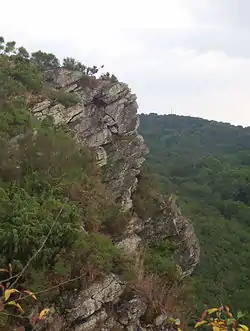
Norman Switzerland (French: Suisse Normande) is a part of Normandy, France, in the border region of the departments Calvados and Orne. Its name comes from its rugged and verdant relief resembling the Swiss Alps, with gorges carved by the river Orne and its tributaries, and by erosion in the Armorican Massif between Putanges-Pont-Écrepin and Thury-Harcourt. The river has created a rugged landscape.
Churches, houses and farm buildings have a style closer to what is found across the English Channel in the United Kingdom (i.e., stone buildings with slate roofs), rather than the timber structures of the Pays d'Auge.
There are many outdoor tourist activities: canoeing, horse riding, rock climbing, hang gliding, kayaking, paragliding and mountain biking.
Geography
Suisse Normande is Located at the end of the Armorican Massif.[1] In the hills, small steep fields are often bordered by thick hedges or granite dry stone walls and have dense vegetation. Mont Pinçon, at 362 metres (1,188 ft) in elevation, is the highest point in Norman Switzerland.[2]
The main water course ways through the area are the river Orne and three of its tributaries, Noireau, Rouvre and the Baize.[3] In addition two more rivers run through the area and merge with the Noireau, the Vere and the Druance.[4][5] From Putanges-Pont-Écrepin part of the Orne has been made into an artificial 6 km long lake covering 240 acres called Rabodanges Lake.[6]
Towns and Communes
The main towns are Athis-de-l'Orne, Clécy, Condé-sur-Noireau, Pont-d'Ouilly, Putanges-Pont-Écrepin and Thury-Harcourt.
A total of 75 communes from six different Communauté de communes make up Suisse Normand as shown below;[3]
Communauté de communes Cingal-Suisse Normande
- Cauville
- Cesny-les-Sources
- Clécy
- Combray
- Cossesseville
- Croisilles
- Culey-le-Patry
- Donnay
- Espins
- Esson
- Grimbosq
- La Pommeraye
- Le Bô
- Le Vey
- Les Moutiers-en-Cinglais
- Martainville
- Meslay, Calvados
- Montillières-sur-Orne
- Mutrécy
- Ouffières
- Saint-Lambert
- Saint-Laurent-de-Condel
- Saint-Omer
- Saint-Rémy
- Thury-Harcourt-le-Hom
Communauté de communes Intercom de la Vire au Noireau
Communauté d'agglomération Flers Agglo
Communauté de communes du Pays de Falaise
Communauté de communes du Val d'Orne
History
The area was first described in 1828 as being like Switzerland in appearance when local historian, Jean-Frédéric Galeron (1794-1838), describes the area of Saint-Clair, Clécy and Athis and Pont-d'Ouilly as 'It's a little Switzerland for the inhabitants of Falaise'.[7]
 Railway poster for Suisse Normande circa 1900
Railway poster for Suisse Normande circa 1900 Postcard from 1914 of La Roche-Bunel Thury-Harcourt petite Suisse Normande
Postcard from 1914 of La Roche-Bunel Thury-Harcourt petite Suisse Normande
The term “Norman Switzerland” was popularized in particular by the railway companies which made the sites of the area accessible to a greater number and use it for promotional purposes. A State Railways poster, from the 1900s, promotes "travel at reduced prices" and shows, under the title "La Suisse normande", a view of the Orne valley in Clecy. In these same years, postcards began to fix the name, and hoteliers also took advantage of thiese flattering images, for example in the 1900s, Clécy had a “hotel of little Switzerland” and a “hotel of the Norman Alps”.[8][9]
After the First World War, the mayor of Clécy wanted to cement the town as a major tourist resort notably by creating safe drinking water and the proper treatment of efluents, a rarity for the time.[10] In 1932, the mayor, then invited the Under-Secretary of State for Tourism, who visited Thury-Harcourt, LaRoche d'Oëtre, Falaise, and solemnly declared Clécy capital of Swiss Normandy.[11][12] In 1933, Father Joseph Delacotte wrote a tourist guide entitled "La Suisse normande", explaining the area was larger than what was originally defined and in 1935, the tourist office of the Suisse Normande had 74 signposts produced, with its header, which showed tourists the sites to visit.[13][11]4
In 1960 Rabodanges Lake was formed by EDF when they created a hydroelectric dam on the Orne River[14]
In 2007 Thury-Harcourt hosted the European Canoe Polo Championship.[15]
Places
- The Rock of Oëtre, a sheer cliff overlooking the Rouvre from 118 metres (387 ft) above, is a popular tourist site. It can resemble a human face seen in profile.[16]
- The Rabodanges hydro-electric dam and its feed lake starting at Putanges-le-Lac which can be used for fishing, powerboating and water skiing.
- The Pits of Hell, a museum in Saint-Rémy based around the old iron mines.
- The town of Pont-d'Ouilly and its café by the Orne riverside, which every Sunday makes space on the river for the canoe polo team to practice. (The town's team is one of the best in France).
- The town of Clécy and its cafés by the Orne riverside, for its pedalos, and closeness to cliffs suited to climbing, hang-gliding and paragliding, in the communes of Saint-Omer and Vey.
- Jardin Intérieur à Ciel Ouvert is a public garden in Athis-Val de Rouvre that is classified as a Jardins remarquables by the Ministry of Culture and the Comité des Parcs et Jardins de France.[17]
- Renaissance Garden of Sainte-Honorine-la-Chardonne another garden classed as Jardins remarquables by the Ministry of Culture and the Comité des Parcs et Jardins de France based in Sainte-Honorine-la-Chardonne[18]
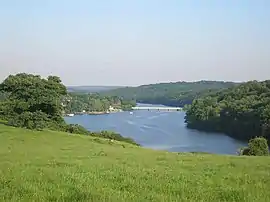 Rabodanges Lac
Rabodanges Lac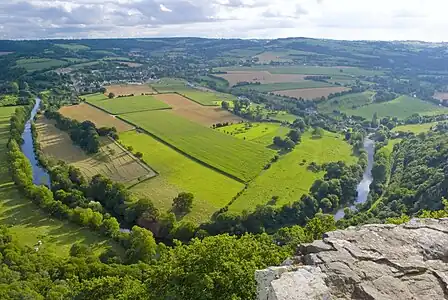 View of Saint-Omer
View of Saint-Omer Pont-d'Ouilly
Pont-d'Ouilly 'Pits of Hell' Museum.
'Pits of Hell' Museum.
Monuments
- The Château de Pontécoulant the home of the Le Doulcet de Pontécoulant family since the 14th century.[19] The Chateau today dates mostly from the 16th and 17th century.[20] It was classed as a Monument historique in 1927.[21] Its 18th century gardens were classed as Monument Historique 60 years later.[22]
- The Château de la Pommeraye, an 18th-century château, built in 1743 set in a verdant landscape. It was classed as a Monument historique in 1954.[23]
- Château Ganne Remains of a fortified Castle dating back to the 11th century and classed as a Monument historique in 2000.[24] It is located in La Pommeraye.[25]
- The Château de La Tourelle or Château du Bas Martimbosq, feudal vestige of the 14th century, adjoins the banks of the Orne, on the municipality of Curcy-sur-Orne. The current residence was restored and fitted out in the last century, in particular by singer-composer, Nicolas Peyrac then by the Briout family. Today it still has the original towers, the vestiges of the chapel and remaining outer walls, a typical element of the stone medieval heritage of Norman Switzerland today.[26]
- Eglise vivante et parlante, also known as the living and talking church, is a Uniquely decorated church in Ménil-Gondouin.[27] When the local priest, Victor Paysant, arrived in 1873 he decorated the interior and the outside of the church with representations of paradise and hell, religious texts, paintings and frescoes.[28]
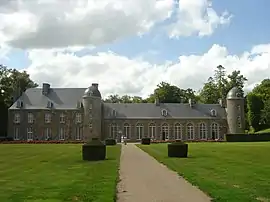 Chateau de Pontecoulant
Chateau de Pontecoulant-2.jpg.webp) Eglise vivante et parlante
Eglise vivante et parlante Tower Gates of Château Ganne
Tower Gates of Château Ganne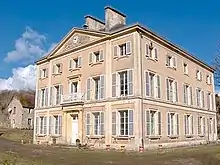 Château de la Pommeraye
Château de la Pommeraye
See also
References
- ↑ "Suisse Normande: Normandy by nature!". Falaise - Suisse Normande.
- ↑ "Mont Pinçon Heath". Calvados Tourisme.
- 1 2 "Map of Suiss Normande" (PDF).
- ↑ Sandre. "Fiche cours d'eau - La Druance (I24-0420)".
- ↑ Sandre. "Fiche cours d'eau - La Vere (I24-0410)".
- ↑ "Lac de Rabodanges PUTANGES-LE-LAC : Normandy Tourism". Normandy Tourism, France.
- ↑ "Statistics of the district of Falaise. Volume 2 by Jean-Frédéric Galeron".
- ↑ Gérard 2019, p. 30.
- ↑ ""Suisse-Normande"". Fédération des guides de Normandie.
- ↑ Gérard 2019, p. 43.
- 1 2 Gérard 2019, p. 45.
- ↑ "L'Œuvre". Gallica. September 11, 1932.
- ↑ Joseph Delacotte, La Suisse normande, ses beaux sites, leur histoire, leur poésie, Jouan & Bigot, Caen, 1933, p. 5.
- ↑ "Orne. A Rabodanges, plongez au cœur du plus grand lac du département". tendanceouest.com.
- ↑ "Canoe Polo Championships History, sorted by Year, Class and Ranking" (PDF).
- ↑ "The man in the Roche d'Oëtre | Tales from France's smallest, oldest mountain". April 10, 2018.
- ↑ "" Intérieur à ciel ouvert " - Comité des Parcs et Jardins de France". www.parcsetjardins.fr.
- ↑ "Jardins du manoir de La Boisnerie - Comité des Parcs et Jardins de France". www.parcsetjardins.fr.
- ↑ "The Domaine de Pontécoulant". Calvados Tourisme.
- ↑ "Château de Pontécoulant, Pontécoulant, France - SpottingHistory.com". www.spottinghistory.com.
- ↑ "Château". www.pop.culture.gouv.fr.
- ↑ "Parc du château". www.pop.culture.gouv.fr.
- ↑ "Château". www.pop.culture.gouv.fr.
- ↑ "Château Ganne". www.pop.culture.gouv.fr.
- ↑ "Château-Ganne | Norman Connections | Discover Norman History". www.normanconnections.com.
- ↑ "LES REMPARTS DE CURCY-SUR-ORNE (Calvados)". Médiévale... Remparts de Normandie.
- ↑ "L'église parlante et vivante à visiter ce week-end". www.ouest-france.fr.
- ↑ "Normandie. Cette église ornaise est un monument à histoires". www.ouest-france.fr.
External links
- Suisse Normande Tourist Office (in French and English) (requires JavaScript)
- Official site of the Château de la Pommeraye (in English)